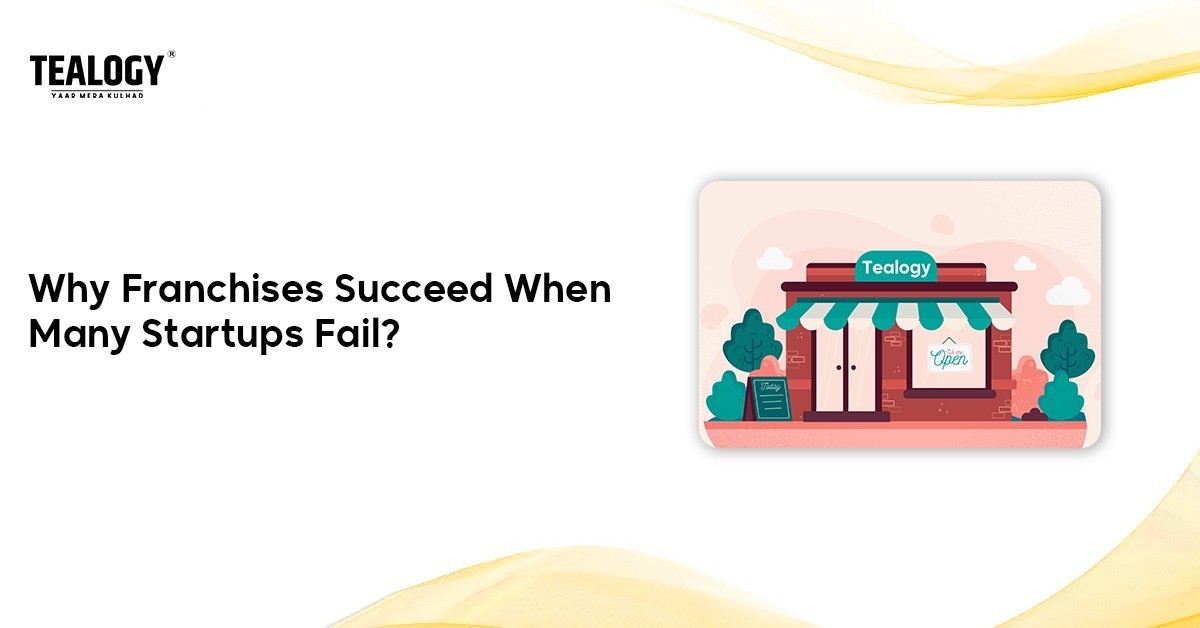

Why Franchises Succeed When Many Startups Fail?
Starting a business is an exciting yet challenging journey. While some startups manage to grow into successful enterprises, the harsh reality is that a large percentage fail within the first few years. On the other hand, franchises continue to expand and thrive across industries. But why do franchises have a higher success rate compared to independent startups? The answer lies in structure, support, and strategic growth.
The Reality of Startup Failures
Entrepreneurship is often romanticized as a journey of passion, creativity, and limitless potential. However, statistics paint a different picture. According to reports, around 90 per cent of startups fail, with nearly 20 per cent shutting down within the first year itself. The reasons vary, but some of the most common challenges startups face include:
Despite these challenges, franchising offers a structured and proven way to mitigate these risks.
Why do Franchises Have a Higher Success Rate?
Franchising provides entrepreneurs with a structured business model, brand reputation, and ongoing support. Let’s explore the key reasons why franchises succeed when many startups fail.
1. Established Brand Recognition
One of the biggest hurdles for startups is building a recognizable brand. Customers tend to trust established names over unknown businesses. Franchises benefit from an already-established reputation, making it easier to attract customers from day one.
For example, in the food and beverage industry, an independent tea shop might struggle to gain traction, while a tea franchise with a well-known brand name can immediately draw in customers who already trust its quality and service.
2. Proven and Tested Business Model
Startups often operate on trial and error, trying to find the right business model that works. Franchises, however, come with a blueprint that has already been tested in multiple locations. This minimizes risk and ensures that the business model is effective.
For instance, McDonald's, Domino’s, and other successful franchises have perfected their operations, menu, and service models over decades, making it easy for franchisees to replicate their success.
3. Comprehensive Training and Support
A major reason why startups fail is that entrepreneurs often lack experience in business management. Franchise owners receive structured training and ongoing support in various aspects, including:
This hands-on support ensures that franchisees don’t have to navigate business challenges alone.
4. Easier Access to Funding and Investments
Securing funding is one of the biggest challenges for startups. Banks and investors are often hesitant to fund new businesses due to high risks. Franchises, however, have a track record of success, making them a safer bet for financial institutions. Many franchise businesses also offer financing options or tie-ups with banks, making it easier for franchisees to access capital.
5. Economies of Scale and Bulk Purchasing Power
Franchisees benefit from the bulk purchasing power of the parent company. They can source materials, ingredients, and supplies at lower costs compared to independent startups. This reduces expenses and increases profit margins.
For example, a standalone tea café might struggle to negotiate with suppliers, while a tea franchise with multiple outlets can get better pricing due to high-volume orders.
6. Marketing and Advertising Advantage
Marketing is crucial for business growth, but startups often struggle with limited budgets and expertise. Franchise businesses invest heavily in marketing at a national and regional level, ensuring brand visibility.
From television ads to social media campaigns, franchises have a well-structured marketing strategy that benefits all outlets. This level of exposure is difficult for independent startups to achieve.
Case Study: How Domino’s Franchise Outperformed Independent Pizza Shops
Background
The pizza industry is highly competitive, with independent pizzerias and major franchises battling for market share. While many local pizza shops focus on traditional recipes and personalized service, franchise giants like Domino’s have taken a different approach scalability, technology, and brand consistency.
Challenges Faced by Independent Pizza Shops
Local pizzerias often struggle with:
How Domino’s Franchise Overcame These Challenges
The Outcome
While independent pizzerias continue to operate in niche markets, Domino’s dominates the industry with thousands of outlets worldwide. Their franchise model ensures that entrepreneurs receive training, brand recognition, and a proven business strategy, reducing the risks associated with running an independent restaurant.
How the Tea Business is Becoming a Popular Franchise Model?
Tea has always been a part of India’s daily life, but in recent years, it has evolved from a simple beverage to a booming business opportunity. With the growing popularity of chai cafés, the tea industry is now one of the fastest-growing franchise sectors. But what makes tea franchises so appealing? Let’s break it down.
1. Low Investment, High Returns
Compared to large food chains, starting a tea franchise requires a lower investment. Since tea has a high profit margin and low raw material costs, franchise owners can generate good revenue with minimal operational expenses.
2. Wide Consumer Base
Tea is not limited to a specific audience everyone drinks it. Whether it’s students, office-goers, or elders, tea cafés attract all kinds of customers, ensuring steady footfall throughout the day.
3. Brand Recognition and Trust
A franchise provides the benefit of an already established brand. Customers trust well-known tea cafés, making it easier for new outlets to attract customers compared to an independent startup.
4. Standardized Taste and Quality
Tea franchises maintain consistency across all locations, ensuring that customers get the same taste and experience every time. This brand consistency builds loyalty and repeat customers.
5. Innovative Concepts and Menu Expansion
Modern tea cafés are not just about chai; they offer a variety of tea blends, snacks, and regional flavours. Franchises innovate their menu to keep up with consumer trends, making them more appealing than traditional tea stalls.
6. Scalability and Growth
Tea franchises have the flexibility to expand rapidly. Many brands now operate in multiple cities, showing that the demand for chai cafés is not limited to metro areas but extends to tier-2 and tier-3 cities as well.
7. Changing Consumer Preferences
Young consumers are shifting from roadside tea stalls to organized café chains that provide a comfortable and hygienic ambience. The café culture is driving the tea industry toward a structured franchise model.
Final Thoughts: Is Franchising the Safer Path to Success?
While startups bring innovation and creativity, franchises provide stability, support, and scalability. The structured approach of a franchise significantly reduces the risks of failure and increases the chances of long-term success.
For aspiring entrepreneurs looking for a business opportunity with lower risks, franchising offers a viable and proven model. It combines the excitement of owning a business with the security of an established brand and operational framework.
The tea franchise model is gaining momentum because of its affordability, scalability, and strong market demand. As people continue to embrace tea cafés for both traditional and premium experiences, the franchise model is set to grow even further.
A great example of this success is Tealogy, which started with a simple vision but has now expanded to 170+ cities with 430+ outlets. By combining affordability, quality, and the cultural essence of kulhad chai, Tealogy has built a strong community of tea lovers while also providing employment to rural artisans. As the franchise continues to grow, it proves that a well-crafted tea business can thrive in India’s ever-evolving café culture.
In a world where many startups struggle to survive, franchises continue to thrive. The choice between starting from scratch or building on an established foundation could be the key difference between success and failure.